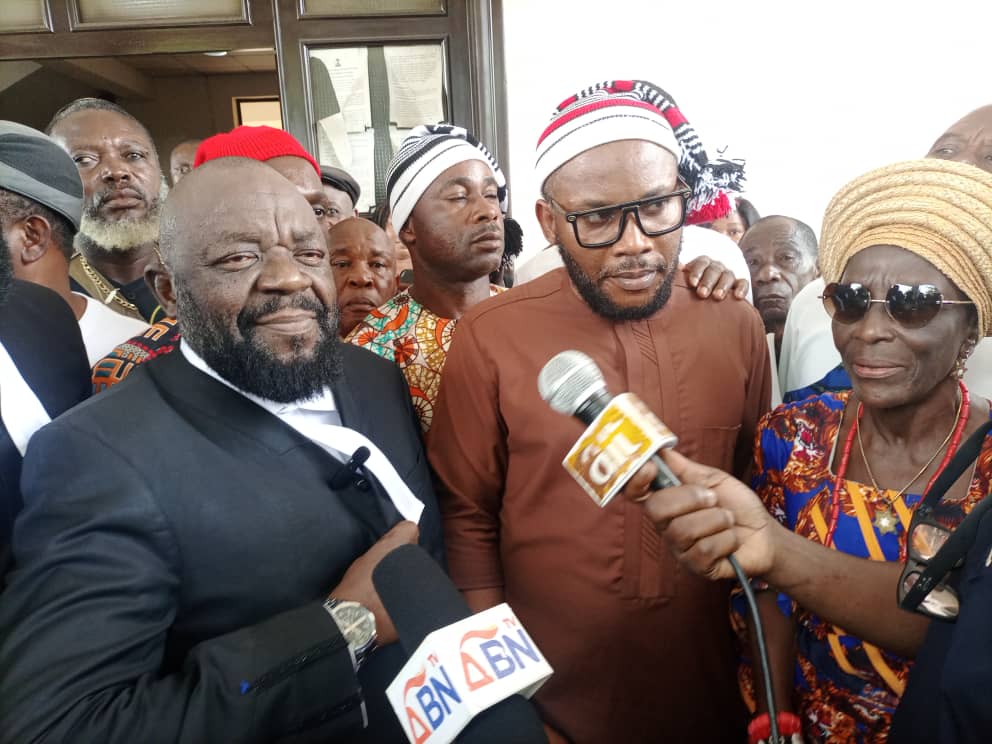Stephen Ukandu, Umuahia
Federal High Court sitting in Umuahia, Abia State, has slated October 27 for judgment in the suit filed by the Leader of the Indigenous People of Biafra, IPOB, Mazi Nnamdi Kanu, challenging his extraordinary rendition from Kenya.
When the matter came up for hearing Tuesday, counsels to both parties adopted their written applications.
Presiding Judge, Justice Evelyn Anyadike, after listening to the arguments by both parties, fixed October 27 for determination of the matter.
Kanu, in the suit filed by his Special Counsel, Mr Aloy Ejimakor, is challenging his extraordinary rendition from Kenya by the agents of the Federal Government.
However, Counsel to the Federal Government, Simon Enoch, of the Federal Ministry of Justice, in adopting his written addresses, prayed the court to dismiss the suit claiming that it is an abuse of court processes.
He argued that the matter had already been decided by the Abia State High Court, and further claimed that Kanu had earlier jumped bail before his re-arrest in Kenya.
But in a swift objection, Kanu’s lawyer reminded the court that the case decided by the Abia High Court was different from the current suit as the former only dwelt on the military invasion of Kanu’s house in 2017, which was decided in his favour.
Kanu’s lawyer argued that the subsisting suit was on the unlawful rendition of Kanu from Kenya to Nigeria by the agents of the Federal Government without any warrant.
He insisted that the Federal Government should be made to produce the legal instrument or authority upon which the “abduction or extraordinary rendition of Kanu was based.”
“My client remains an unlawfully expelled individual, and cannot be subjected to any trial because he was unlawfully renditioned,” Kanu’s lawyer argued.
He further reminded the court that the United Nations Commission on Human Rights had already directed the Nigeria Authorities to unconditionally release Kanu, and compensate him for the violation of fundamental human rights.
Ejimakor also informed the Court that Kanu’s health condition was deteriorating and he urgently needed the attention of his personal physician.
According to him, Kanu has to be alive first to take his trial.
After listening to the arguments and submissions of both counsels, the presiding Judge, Justice Evelyn Anyadike, fixed October 27 to deliver judgment on the matter.
Later in an interview with newsmen, Kanu’s lawyer said that the IPOB Leader would first be released from detention and be returned to Kenya or Britain where he was residing before the Federal Government would apply for his extradition.
He argued that in law, “you cannot detain somebody you don’t have the authority to arrest.”
Kanu’s lawyer likened the rendition of his client to the attempted kidnap of former Minister for Transportation, Alhaji Umaru Dikko by the Federal Government from Britain in 1984, in which those involved in the act were arrested and prosecuted, and Nigeria punished by the United Kingdom.
He further said that Kanu’s quest for a referendum on Biafra was not a crime as part of eastern Nigeria was lost to Cameroon, and part of southern Cameroon became Nigeria respectively via plebiscite.
Ejimakor, however, expressed hope that his client would get justice at the court.
Some of Kanu’s legal team members at the court hearing were Patrick Agazie; Ifeyinwa Nworgu, Tochukwu Arugbuonye, Franklin Amandi, Ohaeto Uwazie, and Mandela Umegborogu.
Kanu’s younger brother, Prince Emmanuel Kanu; other family members, Jewish Rabbis and numerous supporters were also sighted at the court.
Below are some of the reliefs being sought by Kanu:
“1, A DECLARATION that the arrest of the Applicant in Kenya by the Respondents’ agents without due process of law is arbitrary, and the Respondents’ enforced disappearance of the Applicant for eight (8) days and their refusal to produce the Applicant before a Kenyan Court for the purpose of Applicant’s extradition is illegal, unlawful, unconstitutional and amount to infringement of the Applicant’s fundamental right against arbitrary arrest, to his personal liberty and to fair hearing as enshrined and guaranteed under the pertinent provisions of CFRN and the Charter.
“2, A DECLARATION that the detention of the Applicant in a non-official secret facility in Kenya and the torture of the Applicant in Kenya by the Respondents’ agents is illegal, unlawful, unconstitutional and amount to infringement of the Applicant’s fundamental right against unlawful detention, torture and to fair hearing, as enshrined and guaranteed under the pertinent provisions of CFRN and the Charter).
“3, A DECLARATION that, pursuant to Article 12(4) of the Charter, the expulsion (or extraordinary rendition) of the Applicant from Kenya to Nigeria by the Respondents without a decision taken in accordance with the law of Kenya is illegal, unlawful, unconstitutional and amounts to infringement of the Applicant’s fundamental right to fair hearing and not to be expelled from a State Party to the Charter except by virtue of a decision taken in accordance with the law, as enshrined and guaranteed under the pertinent provisions of CFRN and the Charter.”

